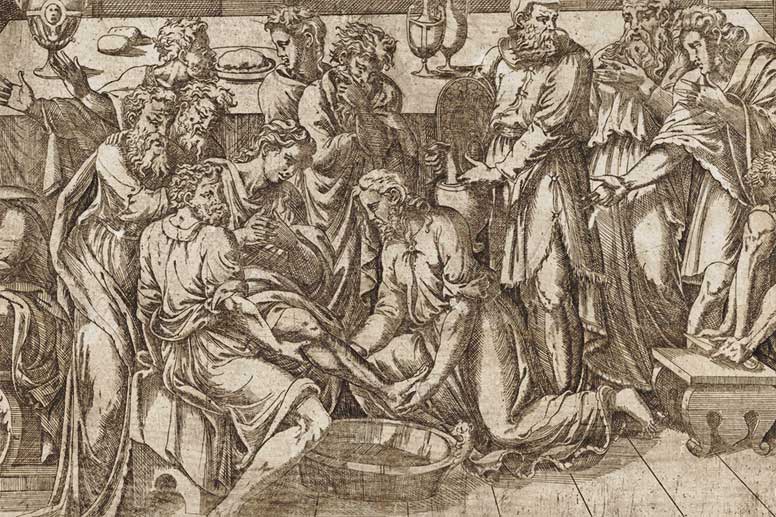
Detail from “Jesus Washing the Feet of the Disciples” by Antonio Fantuzzi via The Metropolitan Museum of Art, licensed under CC0 1.0
Even given all the disagreement within the Christian tradition as to theology and church polity, one would hope we still agree that Christians are to serve others with humility and grace. Like the Lord we claim to follow, we are the ones to be washing feet and not the other way around (John 13).
But whose feet are we to wash? Do we wash only the feet of those we agree with, who are a part of our tribe, who we consider friends? Only other Christians — and even then — only those we agree with? Whose feet? Relatedly, are we endorsing or participating somehow, in the views or actions of others, when we serve them?
And what does it mean to serve someone? Is it serving only if done privately? Is it serving if done as a part of business — where profit or employment is involved? We often hear businesses talk about “serving” their customers. Would they serve if we didn’t pay? I doubt it. However, don’t many Christians talk about their businesses as more than just a way to make a living or profit? Don’t they often see them as vehicles for serving others, beyond a profit motive? Can Christians really compartmentalize the times and moments of their calling to serve others?
Let’s look at two specific times Jesus served people who, if we consider his divinity, he knew everything about; or, if we consider his humanity, he knew little-to-nothing about (paradox anyone?). The first is the wedding at Cana (John 2).
Jesus and his mother are invited to a wedding. The host family runs out of wine, which then, like now, would be quite embarrassing. Back then, one could hardly just run to the store and buy more. Thus, Jesus is asked by his mother to “serve,” to step into this situation, and do something.
What does Jesus know about the people at this wedding? Can we assume many of them were good, decent people? Can we assume some of them might even end up following Jesus? Can we also assume some of the people there were not very nice or decent people? Can we assume some of them were either amoral or immoral in many aspects of their lives? Can we assume some of them would never follow Jesus and, in fact, might even become his enemy? So, some friends, some indifferent, and some enemies, potentially, right? Some good, some bad? Some moral, some immoral? Obviously, a lot of our surmising here is surface at best, as all of us are a mixed bag, but you get my point: there are all sorts of people at this wedding.
And notice, the world would not end if there were no more wine. Other than embarrassment to the wedding party and host family, there is no harm done if the flow of wine ends. No one will die of thirst. To provide more wine at this point is purely an act of social kindness (to prevent embarrassment) and a furthering of festive spirit given the event.
And yes, I am aware of the deeper spiritual meanings and applications behind what Jesus does here. That doesn’t change the rather gratuitous extravagance we see here, given there is no dire need. Also, notice, there is no inventory of any invitee’s worth, religious/political views, or moral standing, going into the calculus of whether or not Jesus will provide this “service,” or who will benefit.
The other example is the feeding of the five thousand (Matt 14). Again, I am aware of the deeper spiritual and theological meanings running through this story/event. We can still ask the same questions we posed regarding those attending the wedding in Cana.
What does Jesus know about these five thousand? There are, or course, many more than five thousand if we count women and children (and we should!). Out of these, probably ten to fifteen thousand people, does Jesus know who is divorced, having an affair, or plotting to kill his neighbor? Does he know who, in that crowd, is a gossip, or greedy? Does he know who is recently out of prison, or is an immigrant from another land?
Or consider it in modern terms, would he know who was a Democrat, Republican, liberal, or conservative? Would he know what faith or denomination each belonged to or claimed? Would he know who was an atheist?
Also, can we assume, in a crowd that large, that some were gay? I think we safely could. So, in either case, wedding or crowd, does Jesus know who was gay?
What does Jesus know about these five thousand or of the people at the wedding? Everything? Nothing? Something? Also, would it matter if there were only ten people at each event? Five? Two? Did the amount of people pose a problem as to his knowing these sorts of things about them or needing to know?
Jesus either knew these things about each, or he didn’t care to find out. But, here’s the thing: Either way — he feeds and provides wine for everyone present and does so to abundance. He serves.
Are we better judges of a person (or crowd) than Jesus? Are we able to see further into someone’s heart than Jesus? Do we know the Scriptures better than Jesus?
A final point. When washing the feet of the disciples, Jesus eventually came to Judas. He knew Judas would betray him. He knew Judas was a thief. Did Jesus refuse to wash his feet? Further, since we know he didn’t refuse, are we to believe such was an endorsement or approval of betrayal or theft?
As I serve, as I wash (metaphorically or otherwise) the feet of others, maybe I should be more concerned about whether or not my service is an endorsement of my life, and my claim to follow Jesus, more than I am of whether it is an endorsement of the other person’s life or claims. Maybe I should leave that to God.
 About Darrell Lackey
About Darrell Lackey
Darrell Lackey has been a lead pastor and currently works in the private sector. He is part of a home gathering of some amazing, wonderful Christians and a graduate of the University of San Francisco and Golden Gate Baptist Theological Seminary (Now Gateway). You can follow him or read more of his writings at Divergence (A Journey Out of Funda-gelicalism). He and his wife reside in Northern California.